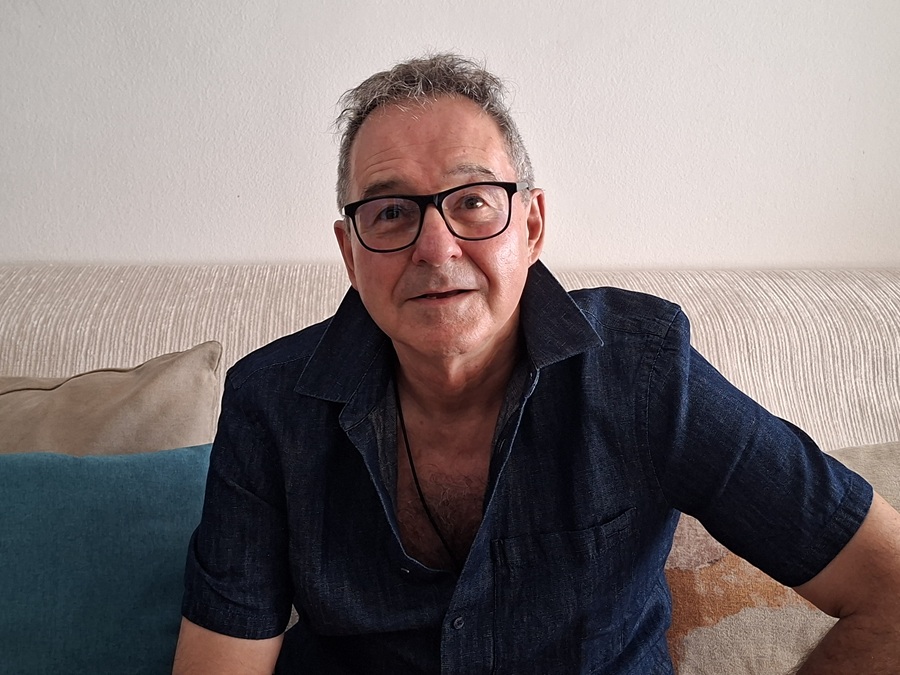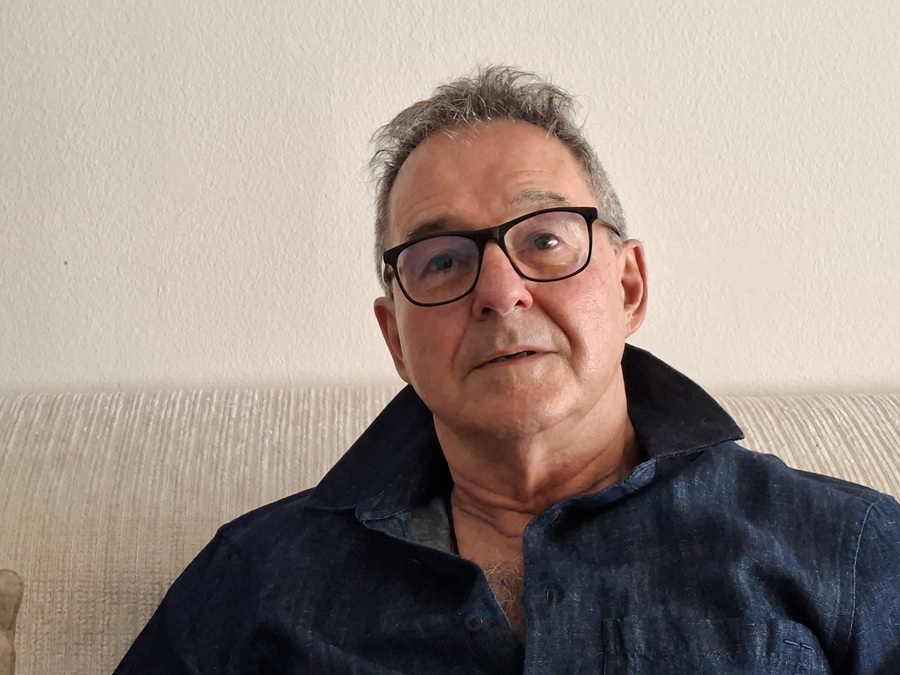- Face to face
- 15 de September de 2025
- No Comment
- 18 minutes read
Xavier Massó: “There is now a social and critical debate on education”

FACE TO FACE WITH
Xavier Massó, writer, president of the Episteme Foundation and former General Secretary of the Secondary Teachers’ Union (aspepc·sps)
Xavier Massó: “There is now a social and critical debate on education”

Xavier Massó Aguadé is a catedrático1 in Philosophy in secondary education, with a distinguished career in both the classroom and the trade union movement. With degrees in Philosophy and Anthropology, he has devoted most of his professional life to secondary teaching, while working tirelessly to protect teachers’ rights and to champion the central role of knowledge in education.
Massó is well known in the education sector for having served, until recently, as spokesperson and General Secretary of Professors de Secundària (aspepc·sps), the largest union representing secondary school teachers in Catalonia. In that role, he led numerous initiatives in defence of subject-specialist teaching, high educational standards, and professional autonomy for teachers.
Today, he heads the Episteme Foundation, created by aspepc·sps to promote rigorous, evidence-based debate on education, with an emphasis on its wider social role.
One of the most vocal critics of recent education reforms – which, in his view, erode academic rigour and diminish the authority of teachers – Massó calls for a demanding public education system based on merit, effort, and deep subject knowledge. He has participated in countless public debates, written opinion pieces, and contributed regularly to the media to put forward his perspective on education policy in Catalonia and Spain. His book, El Fin de la Educación (The End of Education), offers a compelling blend of academic rigour and intellectual honesty in the face of what he sees as a profound crisis in the education system.
What prompted you to become involved in trade union activity within education?
It was the early 1990s, when the LOGSE [General Law on the Education System] was beginning to be implemented. The disaster was plain to see – and something had to be done. Most teaching unions were, whether actively or passively, “yellow” accomplices. I joined the only union that spoke out clearly against the LOGSE and the havoc that the pedagogical model then taking shape was bound to cause.
What do you consider ASPEPC·SPS’s most important achievements in recent years?
It’s hard to list them all. Our fight against the LEC [Catalan Education Act] – essentially a worse Catalan version of the LOGSE – mobilised a major united strike. Yet, when a second strike was called, some of the original organisers backed out, constrained by their own complicity with a system they were only willing to criticise as a token gesture.
On our own, we twice managed to halt – the second time through a court ruling – the indiscriminate admission of primary school teachers into secondary teaching. This would have meant the definitive and irreversible “primarisation” of secondary education, with a single teaching corps for ages 6 to 18 across all non-university levels – the pedagogists’ wet dream, and one shared by certain unions. We also succeeded in having the courts uphold parts of our challenges to the decrees on school autonomy and staffing. All of this, alone.
«We successfully challenged in court the public recruitment call of teaching posts with a designated specialism in digital skills– which in practice meant crony appointments to permanent public teaching posts, just like that»
And again, working alone, we successfully challenged in court the public recruitment call of teaching posts with a designated specialism in digital skills– which in practice meant crony appointments to permanent public teaching posts, just like that. Another court ruling forced the Department of Education to call competitive exams for entry to the school inspectorate: almost twenty years had passed without such a call, with posts instead being handed out through secondment appointments to friends and political allies.
The strikes in spring 2022 secured the reversal of a large part of the previous years’ budget cuts and, in the process, saw off the most incompetent and unscrupulous Minister of Education we have had to date – though competition for that title is admittedly fierce.
More recently, we persuaded the courts to overturn the organisation of the Spanish baccalaureate into subject “areas” – an outright academic aberration. We have similar a favourable judgment, on 4th year of ESO, the Mathematics curriculum has been split to include a second, more academic option, and schools are no longer allowed to decide freely which optional subjects to offer.
For years, together with the Catalan Association of catedráticos (ACESC), we have been pressing the Administration to hold competitive promotions for entry to the corps of secondary education catedráticos– and it appears we are on the way to achieving this.
We have also defended and mobilised in favour of keeping career civil servants affiliated to MUFACE [the mutual health insurance system for civil servants], and we have launched a legally grounded claims campaign – likely to end up in court – to recover the unpaid portion of the sexenios2 when the qualifying period was extended from six to nine years.
Likewise, in defence of individual members facing ostensibly “personal” issues, we have successfully enforced the law in the face of its blatant breaches by the Administration itself – for example, reminding headteachers and inspectors that, if a catedrático is present, they are by law required to head the department.
«We have succeeded in breaking this educational Omertà and in reaching families and professional sectors – with, I believe, considerable success: today there is a social and critical debate on education»
Since 2021, we have driven the creation of the Episteme Foundation, with the aim of spreading a critical discourse on the current educational model, whose deterioration had long been concealed from the public through the information monopoly exercised by those in power and their propaganda commissariats. We have succeeded in breaking this educational Omertà and in reaching families and professional sectors – with, I believe, considerable success: today there is a social and critical debate on education. An educrats’ bunker still remains, entrenched in power and in its usual feeding troughs, but it is becoming ever more discredited socially and intellectually.
In short, the key point, in my view, is that ASPEPC·SPS has been, and continues to be, a union that makes a difference – both in its discourse and in its consistent praxis. We have upheld, and continue to uphold, the dignity of a teaching profession that wishes to remain, above all, a transmitter of knowledge.
How would you describe the current situation of secondary school teachers in Catalonia?
I see a widespread sense of dismay and bewilderment – and with good reason – at the decline of our profession, our working conditions, and the disastrous education policies in place. There is a clear project of dismantling the civil service system, introducing private-sector dynamics which, in state education, simply cannot work – for the simple reason that they are alien to it and incompatible with its nature.
Look, if I open a private school and bring in my friends to work there, that’s my business – and if it fails, I’ve lost my own money. In the public sector, however, the workplace is paid for with public funds, and that demands that appointments follow criteria of transparency, open competition, merit, and ability.
«The LOGSE remains the mother of all education laws that have since been passed in Spain»
What is your assessment of the evolution of education policies from the LOGSE to the LOMLOE?
The LOGSE remains the mother of all education laws that have since been passed in Spain. The problem is not this or that specific measure or its implementation; the problem is the model itself. Unless we change the concept, we will continue to crash.
What role should knowledge play in secondary education?
Its transmission is the original and primary function of any education system worthy of the name. The system must be built around this function.
Should we have learned, subject-expert teachers, or generalist, pedagogical teachers?
Specialist teachers with university degrees in the subjects they teach – without the slightest doubt. To claim otherwise is to deny the importance of transmitting knowledge and, ultimately, to ruin the school and the generations being educated within it.
How do you view the skills-based model compared to the content-based curriculum model?
The skills-based model is like the canoe builder who tries hollowing out tree trunks to see how they turn out, until one happens to float with a degree of stability – and then repeats the process endlessly, mimicking it, because he does not know why some float better than others; he can only rely on trial and error.
The second model is that of the naval engineer: he knows Archimedes’ Principle, understands why some bodies float and others sink, has a theory to rely on – and can thus build anything from a wooden canoe to a steel supertanker, a submarine, or even an airship. I think that example makes things perfectly clear.
«The skills-based model is like the canoe builder who tries hollowing out tree trunks to see how they turn out»
What measures do you consider essential to improve our pupils’ educational outcomes?
There are two types of measures – short-term and medium/long-term. This does not mean they are different measures, but rather that they must be phased in differently. I am talking about coherent, structured academic content curricula; properly approved textbooks; subject-specialist teachers; external graduation exams; serious, quantitative assessments; high standards; effort; routines; resit examinations…
But we must always keep reality in mind. In the short term, for example, we could introduce external exams and shift to a structured, content-based curriculum – and this would lead to greater effort from pupils, teachers, and the entire system. In other words, stop messing about and results would improve. But we must also bear in mind the accumulated deficiencies, and that the effects of a new system will only be fully seen once the cohorts who began under it from the very start have completed their compulsory schooling – not those who enter it at an advanced stage. The damage done over recent decades is enormous; repairing it will not happen overnight. Miracles happen in Lourdes – or in political party manifestos.
«In the present situation, the first step is to acknowledge the extent of the deterioration and dispense with euphemisms. Then, to improve it, we must combine short- and long-term measures intelligently»
One of education’s problems is that its effects are only socially perceptible once the graduates of a given model have entered adult life in significant numbers and across all its dimensions. Politicians have exploited this fact extensively – but reality always catches up with us, whether we like it or not. You don’t need to be a fortune-teller to see that the current model has gone into a nosedive.
In the present situation, the first step is to acknowledge the extent of the deterioration and stop using euphemisms. Then, to improve it, we must combine short- and long-term measures intelligently. I would suggest the following as our guiding motto: return to teaching.

Instruction in the classroom or pupil-centred learning?
Direct instruction, without the slightest doubt. The focus – the object – of an education system is the transmission of knowledge, not the pupil, who is the subject, the user and beneficiary of that system. The pupil is, without question, the reason the education system and schools exist – but they are there for something, towards something. Let me give you an example: the focus of a chess club is not its members, whether seasoned players or beginners, but the game of chess itself – the central activity that unites them, around which they gather, and which gives the club its purpose. Schools are no different: the centre of the system is the transmission of knowledge and its learning.
There is also an essential issue arising from a misunderstanding of this supposed dichotomy between “instruction” and “pupil-centredness”, one that relates to certain pedagogical methodologies. The chronological order of learning is not the same as the logical order in which knowledge is constructed. From the earliest mathematical intuitions arose a number system that gradually became more complex (natural numbers, integers, rationals, irrationals, reals, imaginaries…). A process whose systematisation took centuries, the result of collective historical labour.
«The Pythagorean theorem has already been discovered – the task is to understand it, not “rediscover” it»
This is the legacy to be transmitted in secondary education: knowledge already structured, thematised, systematised, and epistemologically validated. And it must be taught well. It is absurd and unrealistic to expect that what has been a cumulative and collective process over centuries should be replicated experientially in each pupil’s individual mind. The Pythagorean theorem has already been discovered – the task is to understand it, not “rediscover” it. The historical nature of human knowledge lies precisely in its cumulative character: each generation saves itself the path already travelled by the previous one, starting from where they left off, which allows for new contributions, and so on.
In other words: Einstein discovered the theory of relativity because he already knew Newtonian classical mechanics – and the problems it presented, for example, with its corpuscular theory of light or its concept of absolute space. If he had had to discover Newton’s laws on his own, he would never have had time to reach relativity. This is what some people seem to have forgotten.
To be truly critical, one must first have criteria – and that does not exist without a prior base of knowledge. Teaching “critical thinking” in isolation is one of the greatest absurdities I have ever heard.
Have there been tensions between trade union interests and educational standards?
There always are. This is inevitable. But in our case, the differences are not solely about pay or general working conditions; they are also about professional issues and about the very conception of the teaching profession – its role within an education system and what it should consist of.
Imagine if the Ministry of Health were to establish by law that homeopathy should be the official, compulsory medical doctrine and practice – or if urologists were sent to paediatrics, and ENT surgeons to operate on flat feet or hernias. That, by analogy, is what is happening in secondary schools.
«To be truly critical, one must first have criteria – and that does not exist without a prior base of knowledge. Teaching “critical thinking” in isolation is one of the greatest absurdities I have ever heard»
Obviously, a worker’s salary will depend on the qualifications required for the job. If, instead of university-trained subject specialists, we are told that every teacher is a generalist, or a social animator, or that transmitting knowledge is not important, then the teaching profession will inevitably be devalued. You do not require the same body of knowledge from a security guard as from a criminologist – nor do they earn the same salary. And if you hire a criminologist but only give them the duties of a security guard, you are devaluing both the post and the person in it. Two things, at least, follow. First, that you do not consider criminologists necessary and will settle for security guards; and second, that you will pay the latter less than a criminologist who actually works as one. Apply that logic to teaching, and see what results we get.
What urgent measures would you propose to improve teachers’ working conditions?
Urgently: repeal the decrees on staffing, headteachers, and school autonomy, and draft a new education law based on direct instruction and the transmission of knowledge; hold competitions for entry to the corps of catedráticos; organise schools around their academic departments; strengthen subject specialisation; salary adjustments in line with the Consumer Price Index (CPI) increase and the alignment of our salaries with those of other civil servants within the same grade and level (which is not the case today); ensure teachers are dedicated exclusively to academic teaching; create a corps of teaching assistants for non-academic tasks; drastically reduce bureaucracy and the power of the educrats; place academic leadership in the hands of subject-specialist departments… And have an education system based on results, facts, and evidence.
What message would you send to young teachers entering public education today?
Know how to fight for your rights. You are university graduates in a specialism – not general-purpose “handymen and handywomen”. You are there to teach what you know – your subject – and that is where the dignity and professional prestige of teaching lie, as well as your ability to assert your employment and salary rights. Be aware of what many have already discovered for themselves: that in their secondary teacher training master’s, they were sold a false narrative – a completely ‘pie in the sky’ world full of utterly ‘flimsy nonsense’—pure smoke and mirrors, mere flatus vocis… simple trivialities”.
And finally, be aware of the responsibility you assume when you take on teaching: a large part of the future of the next generation – and, by extension, of our society – depends on it.
___
1 highest teaching category in Spanish secondary education (senior lecturer)
2 six-year salary increments awarded to teachers after completing the required professional development credits
Source: educational EVIDENCE
Rights: Creative Commons


